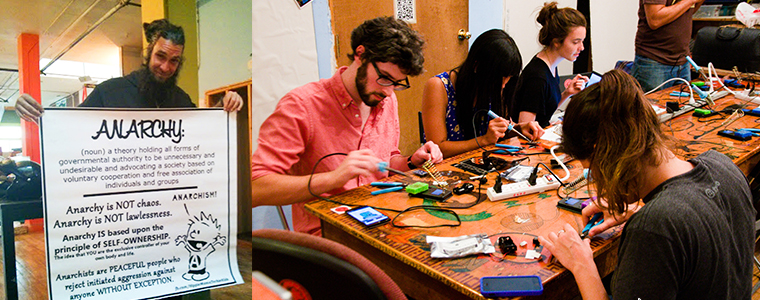
When Joe Biden declared that “arsonists and anarchists should be prosecuted” at a campaign speech in Wilmington, Delaware on July 28, he echoed his archrival Donald Trump. The Democratic candidate’s words could have come from a recent tweet by the incumbent, who conflated “arsonists, looters, criminals, and anarchists” on June 4.
When Biden asserted in the same breath that “peaceful protesters should be protected,” he wasn’t just showing that he hadn’t noticed the multitude of anarchists among the peace protests while he was busy enacting wars. And when he implied that such anarchists are devoted to “violence or destruction of property,” he ignored that real anarchists have uncovered how the nation-state’s ultimatum of force drives rather than resolves conflicts.
Anarchists have understood how “government is civil war” since Anselme Bellegarrigue originated that phrase in one of the earliest anarchist manifestos 170 years ago. Four decades later, Voltairine de Cleyre observed that appealing to “a representative of that power which has robbed you of the earth, of the right of free contract of the means of exchange” to stop theft is to “institute a wholesale robber to protect us from petty larceny.”
Bellegarrigue’s insistence that “anarchy is order” wasn’t entirely alien to the liberalism of Thomas Paine, who saw how a “great part of that order” in society “is not the effect of government” but “existed prior to government, and would exist if the formality of government is abolished.” Thomas Jefferson admitted that it was “not clear in my mind” that society is not best off “without government.”
By the turn of the twentieth century, the US government was passing legislation to exclude such skeptics. Emma Goldman noted that “too late did the lukewarm liberals realize the peril of this law to advanced thought,” with those “disbelieving in organized government” including such leading intellects of the time as Leo Tolstoy, Herbert Spencer, and Edward Carpenter. Biden’s seemingly tepid twenty-first century ideology would handcuff linguist Noam Chomsky, poet Lawrence Ferlinghetti, and anthropologist David Graeber.
“This impression of anarchism as violent and chaotic” has always been useful for “those in power,” as historian Howard Zinn noted, because “they cannot tolerate the idea that there will be no state, no central authority” … and no need for them. The Student Non-Violent Coordinating Committee “did not wait for the government to give them a signal” to fight segregation, and in so doing “embodied the characteristics of anarchism.” Zinn recommended such efforts to push against injustice be built up outside of the formal political process, foreseeing that “if we have a movement strong enough, it doesn’t matter who’s in the White House.”
New Yorker Joel Schlosberg is a contributing editor at The William Lloyd Garrison Center for Libertarian Advocacy Journalism.
PUBLICATION/CITATION HISTORY
- “Anarchists Didn’t Start the Fire,” by Joel Schlosberg, CounterPunch, 07/04/20 [sic]
- “Anarchists Didn’t Start the Fire,” by Joel Schlosberg, Anchorage, Alaska Press, 08/01/20
- “Anarchists Didn’t Start the Fire,” by Joel Schlosberg, Ventura County, California Citizens Journal, 08/03/20
- “Anarchists didn’t start the fire,” by Thomas L. Knapp [sic], Claremont, New Hampshire Eagle Times, 08/05/20


